Much of the olive industry is doing whatever it takes to get those olives from the tree to your table as quickly as possible, but there is one family-run farm taking the time–and the salt–to do it right. Les Moulins Mahjoub has been using “traditional food preservation techniques of the Mediterranean” for over three generations.
Just a brief backstory before we get to the olives.
Les Moulins Mahjoub is a family farm in the lush Mejerda Valley of Tunisia on the southern shores of the Mediterranean–a family committed to “growing methods which respect natural and biological balances…and hand processing techniques.” Many of these traditions are rooted in the historical farming and food preservation approaches of the Berber people, an ancient nomadic tribe that ultimately settled in Tebourba, Tunisia on the land that is now the Mahjoub farm. In the 15th century, the Mahjoub’s Andalusian ancestors settled on this land alongside the Berbers. The two integrated their agricultural and engineering skills to create flourishing farms in and around Tebourba. Some of these traditional practices still used today by Les Moulins Mahjoub include sun-drying food such as couscous and tomatoes as well as hand-crafting products like a variety of spreads, olive oil and, of course, olives. Click here for the full line.
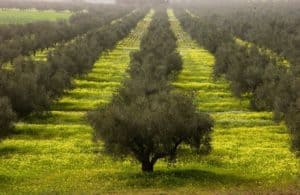
Currently the family farm is run by the ten Mahjoub siblings including Majid Mahjoub, head of promotion and marketing. Of their olives Majid says, “[Our] olives are placed in a natural brine and allowed to soak for about nine months, producing a cured olive with a rich buttery flavor.”
This sounds so simple. Is this technique so different from most other olive producers? It is indeed a simple process and therein lies the secret. More on that in a moment…
So, let’s start with the foundation: the olives. Les Moulins Mahjoub grows and produces two types of organic olives for jarring: Meski and Sahli. The green Meski olives are a plump variety native to Tunisia. The Meski olive is prepared three ways: with garlic and wild herbs; with harissa; or with lemon and fennel. The black Sahli olives–simply and deliciously brined— are tiny and dark violet in color with firm flesh and light salt content.
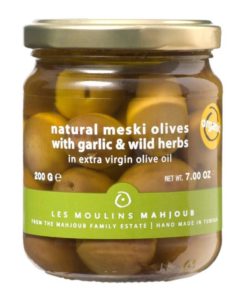
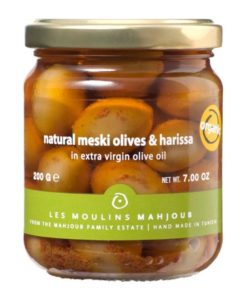
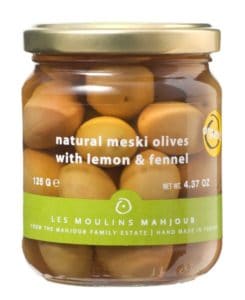
A side note, that the Meski and Black Sahli varieties are different than the Chetoui variety grown specifically for their olive oil. Chetoui olives make for a delicious, apple-green, vegetal, unfiltered soft, clean olive oil. Check out our blog here to learn more about harvest and traditional processing techniques.
Now, for their Meski and Black Sahli jarred olives–to ensure even curing and balanced flavor–the Mahjoubs carefully hand-slice each olive then shock them in salty, cold water to reduce some of the oleuropein, the phenolic bitter compound found naturally in olives. This method–which Majid refers to as “olive slashing”– has been used for many centuries and is considered a healthy and traditional technique which preserves the integrity of the fruit. Majid says, “The oleuropein participates in the conservation of the olive and it is not a question of eliminating it completely. The more the bitterness is removed, the less the olives will be preserved for a long time. The goal is to achieve–through a controlled, slow and calm process–a good level of oleuropein in the olive.”
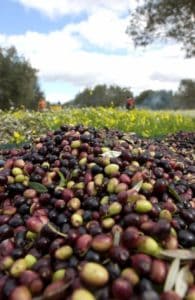 In order to achieve this, Les Moulins Mahjoub begins with a bitter olive at the start of the slow preservation process which allows, at the end, for a “more aromatic olive with…agreeable bitterness and lemony taste.”
In order to achieve this, Les Moulins Mahjoub begins with a bitter olive at the start of the slow preservation process which allows, at the end, for a “more aromatic olive with…agreeable bitterness and lemony taste.”
So, hand-slashing, a slow 8-10 month brine, a retaining of some oleuropein—is this so different from the process of most other olive producers? Well, yes, in short.
Did you know that almost all green olives–I’m talking 99%!–are treated with sodium hydroxide, often called soda or soda lye? Yup, the same substance found in drainage cleaning products.
Why do most producers treat this delicious fruit with the harsh, inorganic compound lye? The process–called deamination–eliminates oleuropein entirely. And it’s quick–within two hours the bitterness has been removed. Two hours versus 8-10 months?!
As I mentioned before, Les Moulins Mahjoub aims to retain a balanced level of oleuropein. And while the treatment with sodium hydroxide does remove bitterness it also degrades the nutritional value and the inherently delicate flavor of the fruit.
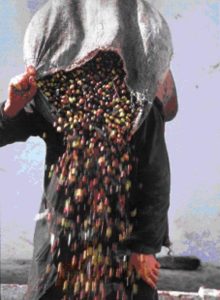 The chemical treatment is much quicker, for sure, but unfortunately residues can remain in the flesh of the olive after the rinsing and before the brining process. Sodium hydroxide is extremely corrosive and dangerous even at a 0.5% concentration. And it’s not just potentially harmful to our health but to the environment and both of these things go against the holistic farming and traditional preserving practices of Les Moulins Mahjoub.
The chemical treatment is much quicker, for sure, but unfortunately residues can remain in the flesh of the olive after the rinsing and before the brining process. Sodium hydroxide is extremely corrosive and dangerous even at a 0.5% concentration. And it’s not just potentially harmful to our health but to the environment and both of these things go against the holistic farming and traditional preserving practices of Les Moulins Mahjoub.
Les Moulins Mahjoub’s olives are preserved with the pits intact to maintain the integrity of the delicate fruit. Other olives are typically pitted and although this is marketed as a convenience for the customer, the reason is that the chemical treatment results in an unappealing blackening around the pit. This unsightly chemical halo must be removed.
The only way to circumvent the treatment of olives with chemicals and still get a sweet, delicate and appealingly bitter olive is, you guessed it, time.
And if there is one thing Les Moulins Mahjoub is good at, it’s patience. Patience in the slow brine on their organic olives. Patience with sun-drying couscous and tomatoes. Patience with embracing and employing the traditional growing, harvest and preservation practices of their Andalusian ancestors and the Berber people.
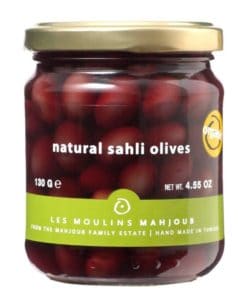
Holistic farming, tradition, community, passion, integrity: Who wouldn’t get behind all of these things?
Majid says, “This method of preservation, the appropriate long time [curing], and the generosity and virtue—all these are being fulfilled in the perfect taste of the olive.”
Turns out, that maybe just a little more than time and salt go into those olives.
Written by Leska Tomash
Organic Meski Olives with Garlic and Wild Herbs
Organic Meski Olives with Harissa